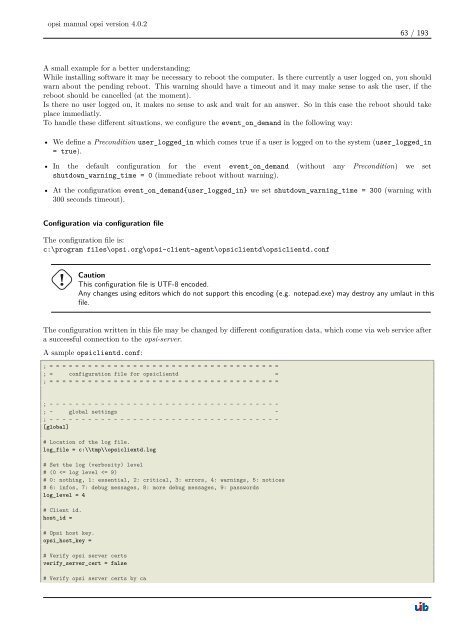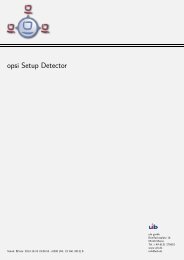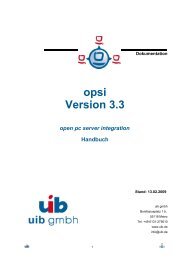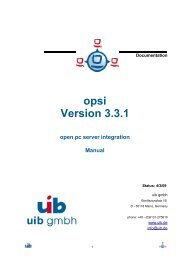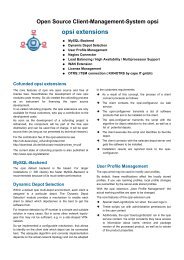opsi manual opsi version 4.0.2 - opsi Download - uib
opsi manual opsi version 4.0.2 - opsi Download - uib
opsi manual opsi version 4.0.2 - opsi Download - uib
Create successful ePaper yourself
Turn your PDF publications into a flip-book with our unique Google optimized e-Paper software.
<strong>opsi</strong> <strong>manual</strong> <strong>opsi</strong> <strong>version</strong> <strong>4.0.2</strong><br />
63 / 193<br />
A small example for a better understanding:<br />
While installing software it may be necessary to reboot the computer. Is there currently a user logged on, you should<br />
warn about the pending reboot. This warning should have a timeout and it may make sense to ask the user, if the<br />
reboot should be cancelled (at the moment).<br />
Is there no user logged on, it makes no sense to ask and wait for an answer. So in this case the reboot should take<br />
place immediatly.<br />
To handle these different situations, we configure the event_on_demand in the following way:<br />
• We define a Precondition user_logged_in which comes true if a user is logged on to the system (user_logged_in<br />
= true).<br />
• In the default configuration for the event event_on_demand (without any Precondition) we set<br />
shutdown_warning_time = 0 (immediate reboot without warning).<br />
• At the configuration event_on_demand{user_logged_in} we set shutdown_warning_time = 300 (warning with<br />
300 seconds timeout).<br />
Configuration via configuration file<br />
The configuration file is:<br />
c:\program files\<strong>opsi</strong>.org\<strong>opsi</strong>-client-agent\<strong>opsi</strong>clientd\<strong>opsi</strong>clientd.conf<br />
Caution<br />
This configuration file is UTF-8 encoded.<br />
Any changes using editors which do not support this encoding (e.g. notepad.exe) may destroy any umlaut in this<br />
file.<br />
The configuration written in this file may be changed by different configuration data, which come via web service after<br />
a successful connection to the <strong>opsi</strong>-server.<br />
A sample <strong>opsi</strong>clientd.conf:<br />
; = = = = = = = = = = = = = = = = = = = = = = = = = = = = = = = = = = = =<br />
; = configuration file for <strong>opsi</strong>clientd =<br />
; = = = = = = = = = = = = = = = = = = = = = = = = = = = = = = = = = = = =<br />
; - - - - - - - - - - - - - - - - - - - - - - - - - - - - - - - - - - - -<br />
; - global settings -<br />
; - - - - - - - - - - - - - - - - - - - - - - - - - - - - - - - - - - - -<br />
[global]<br />
# Location of the log file.<br />
log_file = c:\\tmp\\<strong>opsi</strong>clientd.log<br />
# Set the log (verbosity) level<br />
# (0


